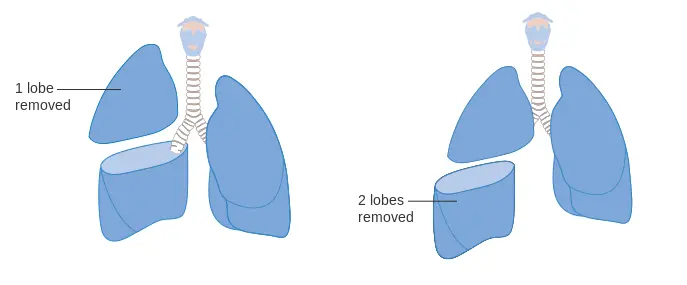What Is a Lobectomy?
A lobectomy is a surgical procedure where an entire lobe of your lung is removed for a variety of reasons that may include a lung cancer diagnosis, infection, COPD or benign tumors. There are three lobes of your right lung and two lobes of your left lung. The procedure includes either a few small incisions (minimally invasive) or one longer incision (thoracotomy) on the side of your chest based on your particular diagnosis. With either approach, along with a lobe, nearby lymph nodes are also removed because of the possible spread of disease or cancer.
What to Expect
Prior to your lobectomy, you have blood and breathing tests (pulmonary function tests), along with a history and physical examination done by your surgeon. Depending on your age and physical condition, further tests to check your heart may be recommended. If you smoke, it is recommended that you quit as soon as possible to decrease your risk of complications during and after surgery. Before surgery, you will be asked not to eat or drink prior to arriving at the hospital. During the operation, you will be completely asleep under general anesthesia, and when you wake up, you will have a drainage tube, or chest tube, coming from your chest to allow excess fluid and air to be removed.
What Happens Next?
Following your surgery, you will likely stay in the hospital two to four days, depending on your surgeon’s preference and how you are recovering. You will be expected to get up and walk around, and will be encouraged to stay out of bed as much as possible starting on the day after your procedure. You will have some pain, which can be controlled with medications and usually resolves within one to two weeks. Upon discharge, you will be given specific wound care instructions and plans for follow-up with your surgeon. The results of your lab and other findings resulting from your procedure will be discussed during that appointment, along with any further care you may need. Most patients are back to their normal routines by one month following surgery.
What Are the Risks?
As with any procedure, there is a risk of bleeding or infection. You will be given antibiotics around the time of surgery to help prevent infection, and the risk of bleeding is minimal with this procedure. There is a small risk that you will need a drainage tube in for a prolonged period of time due to a leak in your lung. This usually heals on its own and will not require further procedures. As with any major surgery, there are also risks related to general anesthesia, such as a heart attack, stroke, blood clots or pneumonia. Your surgeon will discuss each of these risks with you at your preoperative appointment.
Page last updated: November 20, 2024


